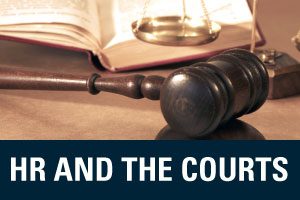HR and the Courts
 Each month, CUPA-HR General Counsel Ira Shepard provides an overview of several labor and employment law cases and regulatory actions with implications for the higher ed workplace. Here’s the latest from Ira.
Each month, CUPA-HR General Counsel Ira Shepard provides an overview of several labor and employment law cases and regulatory actions with implications for the higher ed workplace. Here’s the latest from Ira.
Court of Appeals Reinstates Professor’s First Amendment Free Speech and Religious Discrimination Challenge to University’s Preferred Pronoun Policy on Transgender Students
The U.S. Court of Appeals for the Sixth Circuit (covering Michigan, Ohio, Kentucky and Tennessee) recently reversed a federal trial court dismissal and reinstated a professor’s free speech and religious discrimination lawsuit. The professor sued after being disciplined for not following his college’s directive to refer to a transgender student in his class by the student’s preferred pronoun. The lawsuit was filed against Shawnee State University in Meriwether v. Francesca Hartop, et al. (Case no. 20-3298, 6th Cir 3/20/21).
The professor in this case refused a university directive to call a transgender student in his class by her preferred pronoun. Additionally, the university prohibited the professor from describing his religious views on gender identity in his syllabus. The appeals court concluded that the state university’s prohibition of the professor from describing his views on gender identity in the syllabus violated the professor’s First Amendment rights. The court concluded that a state university cannot, in the name of “conventions of decency” or classroom management, do that without violating the First Amendment.
The university argued the pronoun policy does qualify as protected speech as it did not affect the substance of the professor’s lectures, rather it simply addressed how the professor called on students in his class. The appeals court rejected the argument, concluding that “it is not simply a matter of classroom management, it is a matter of academic speech.” The court additionally stated that the university’s handling of the professor’s request to state his religious views on gender identity in his syllabus violated the constitutional protection of his free religious exercise.
Court of Appeals Rejects Football Coach’s Midfield Prayer Lawsuit
The U.S. Court of Appeals for the Ninth Circuit (covering California, Oregon, Washington, Montana, Idaho, Nevada, Arizona and Alaska) recently rejected a football coach’s challenge to a Washington school district’s decision to put the coach on administrative leave following his refusal to cease his midfield prayer following each game (Kennedy v. Bremerton School District (Case no. 20-35222, 9th cir., 3/18/21)).
The coach argued that the school district failed to accommodate his religious observance and treated him unequally because of his faith. The school district claimed to have offered to discuss alternative accommodations. However, the school district argued that to allow his midfield prayer as an accommodation would violate the establishment clause of the U.S. Constitution.
The court concluded that the facts on the record including the coach’s “media blitz” on the controversy “utterly belie his contention that the prayer was personal and private.” Instead, the court concluded that the coach was engaged in a demonstration aimed at students and the attending public to join him in his religious observance.
Court of Appeals Revives a Professor’s Equal Pay Act Claims After Dismissal by Trial Court
A divided Ninth Circuit Court of Appeals (California, Oregon, Washington, Montana, Idaho, Nevada, Arizona and Alaska) ruled two-to-one allowing a female professor to proceed with her Equal Pay Act claim that she was paid less than comparable male professors. The court overturned the trial court’s dismissal of the action. The appeals court concluded that it is the overall job and core tasks that have to be similar, not individual segments of a job position (Freyd v. University of Oregon (9th cir., Case no. 19-35428, 3/15/21)).
The appeals court concluded that a jury could conclude that the plaintiff and her comparators performed similar work for which the plaintiff was allegedly paid less. The court concluded that all were full professors in the psychology department who conducted research, taught classes, advised students and served on various faculty and other committees. The fact that they did not all teach the same courses, supervise the same students, or mange the same research centers was not enough to deny the plaintiff a trial over her unequal pay allegations.
NLRB Abandons Rulemaking Aimed to Halt Student-Worker Unions
The National Labor Relations Board (NLRB) has abandoned a proposal that would have made student workers at private universities and colleges ineligible to form or join unions. The board has gone back and forth on the issue based on partisan makeup of the board on whether graduate teaching assistants and other student workers at private institutions are considered union eligible. The board granted organizing rights in 2000, rescinded them in 2004, and restored them in 2016. Under the Trump administration proposal, the board was going to issue a rulemaking on this issue. With the current abandonment of that rulemaking, it appears student worker unionization rights at private higher ed institutions will remain intact during the remainder of the Biden administration.


